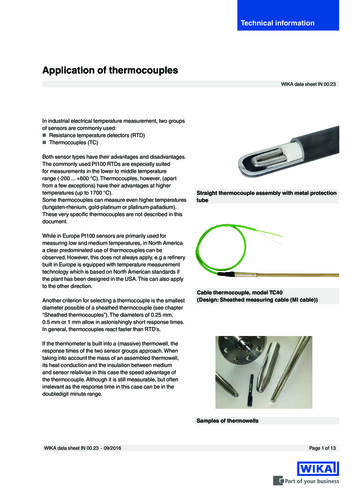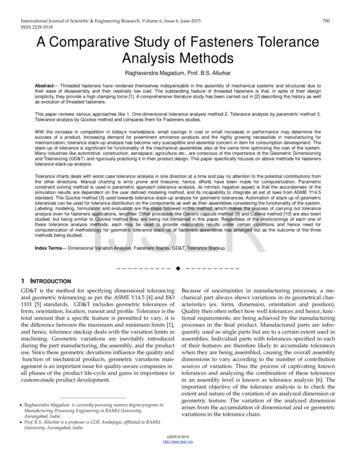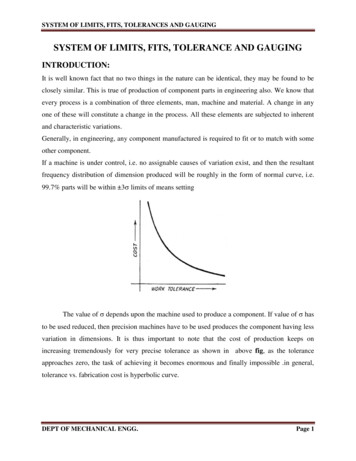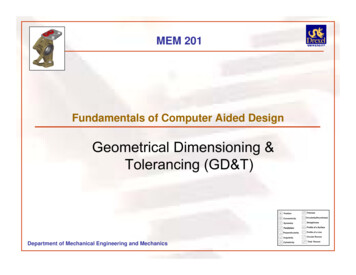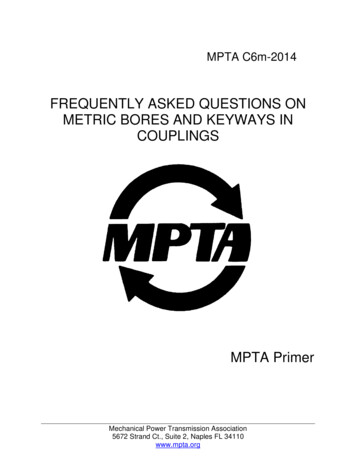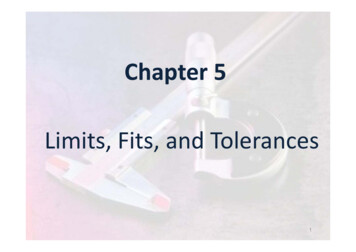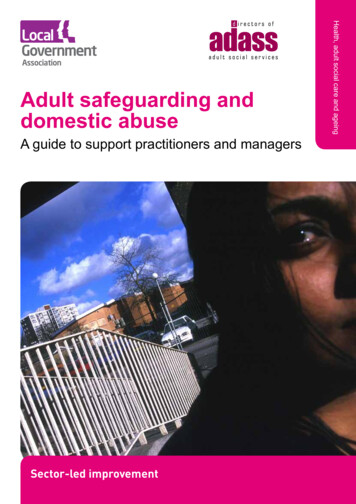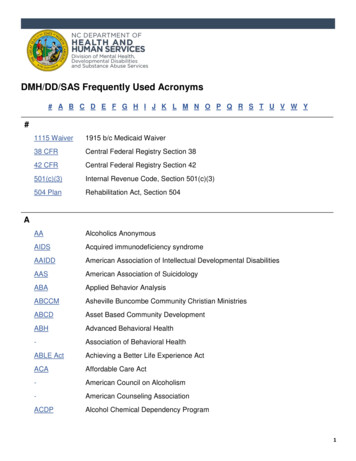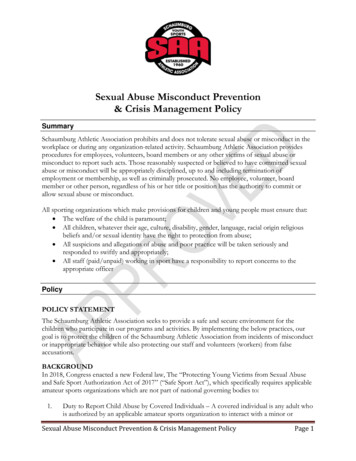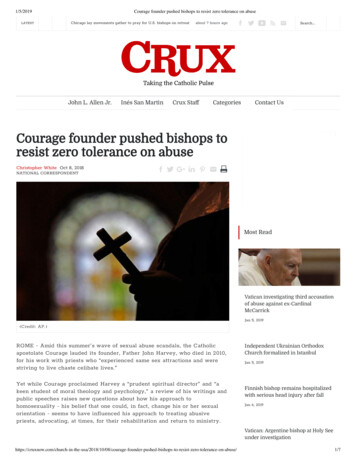
Transcription
1/5/2019LATESTCourage founder pushed bishops to resist zero tolerance on abuseChicago lay movements gather to pray for U.S. bishops on retreatJohn L. Allen Jr.Inés San MartinCrux Staabout 7 hours agoCategoriesSearch.Contact UsCourage founder pushed bishops toresist zero tolerance on abuseChristopher White Oct 8, 2018NATIONAL CORRESPONDENTMost ReadVatican investigating third accusationof abuse against ex-CardinalMcCarrickJan 5, 2019(Credit: AP.)ROME - Amid this summer’s wave of sexual abuse scandals, the Catholicapostolate Courage lauded its founder, Father John Harvey, who died in 2010,for his work with priests who “experienced same sex attractions and werestriving to live chaste celibate lives.”Yet while Courage proclaimed Harvey a “prudent spiritual director” and “akeen student of moral theology and psychology,” a review of his writings andpublic speeches raises new questions about how his approach tohomosexuality - his belief that one could, in fact, change his or her sexualorientation - seems to have influenced his approach to treating abusivepriests, advocating, at times, for their rehabilitation and return to ministry.Independent Ukrainian OrthodoxChurch formalized in IstanbulJan 5, 2019Finnish bishop remains hospitalizedwith serious head injury after fallJan 4, 2019Vatican: Argentine bishop at Holy Seeunder st-zero-tolerance-on-abuse/1/7
1/5/2019Courage founder pushed bishops to resist zero tolerance on abuseJan 4, 2019Throughout his career, Harvey often had a platform to o er U.S. bishops suchadvice. In addition, his close association with a prominent psychologist whoalso argued against the permanent removal of abuser priests, and who was asought-after expert for treatment, has also has led critics to wonder abouttheir influence in shaping the U.S. Church’s early response to the sexualabuse crisis.German cardinal urges change intradition ahead of celibacy discussionJan 4, 2019Harvey and the Abuse ScandalIn the 1970s, Harvey founded a new ministry called “Renewal, Rest, andRecreation,” with the aim of providing support for priests with “sexualdi iculties,” primarily homosexuality. In 1980, that ministry led to aninvitation from Cardinal Terrance Cooke of New York to form a ministry forlay Catholics called “Courage.”In 1994, Courage received Vatican approval from Colombian Cardinal AlfonsoLopez Trujillo, then-president of the Ponti cal Council for the Family, andaccording to its executive director, Father Philip Bochanski, Courage is nowactive in two-thirds of the dioceses in the United States and 15 othercountries worldwide.Crux needs yourmonthly supportto keep delivering the best in smart,wired and independent Catholic news.Support Crux“Much of the spread of the apostolate in the rst three decades was a directresult of Father Harvey’s willingness to travel anywhere he was invited tospeak on the topic of same sex attraction and to consult with people,”Bochanski told Crux.Chief among Harvey’s interested audience members were U.S. bishops who,in addition to inviting him to start the ministry in their own local dioceses,gave Harvey a national platform.Father Thomas Dailey, a close friend of Harvey’s who edited a book on hislegacy, told Crux that “both his work with Courage and also his prominencein the Fellowship of Catholic Scholars, put him in a very good light amongthe bishops.”In a 1992 article in Crisis, a conservative magazine, Harvey described thearguments he had o ered at the Ninth Bishops’ Workshop in Dallas in 1990.Harvey argued that priests who sexually abused minors often did so becauseof sexual addiction, and therefore guilt could not be imputed. On that basis,he claimed bishops could not impose canonical penalties.Instead, he argued, most should be rehabilitated and returned to ministry.While he went on to note that there should be certain conditions, such asbarring participation in overseeing youth ministry, he criticized bishops for adouble standard in not treating abuser priests the same way as they oftentreat alcoholics or drug addicts, who are generally sent to rehab and then putback in the eld.In the article, he criticized bishops moving toward a zero-tolerance policy.“Rather than concentrating on rehabilitating troubled priests, authorities toooften merely ‘shelve’ them, permitting them only the ministry of private Massand/or pushing hard for their immediate laicization,” he wrote.19 Gadgets Perfect For 2019Be on the cutting edge with thesegadgets we picked out just for youLatest StoriesDefrocked priest convictedof sex abuse sentenced inMarchJan 5, 2019Jesuit Father Rayan dies;pioneered theology withan Asian perspectiveJan 5, 2019Vatican investigating thirdaccusation of abuseagainst ex-CardinalMcCarrickJan 5, olerance-on-abuse/2/7
1/5/2019Courage founder pushed bishops to resist zero tolerance on abuseMany Tucson, AZ Drivers Don't EvenKnow This Genius TipIn short, Harvey aimed to convince the bishops to adopt “a more hopeful viewof priests and religious who had been involved in such behavior.”While Bochanski told Crux that in the article, “[Harvey] stated clearly thatthose whose sexual attractions are completely oriented toward children oryouth ‘should not be restored to any pastoral ministry’,” the article alsomakes clear that Harvey believed “relatively few” priests who sexuallyabused minors t in that category.For the rest, he believed that a return would be okay under quali edconditions, and he went on to recommend treatment similar to that of a 12Step-Program, “the heart of which is faith and prayer - so that he keepshimself at a distance from any unsupervised contact with youth.”Richard Fitzgibbons’ In uence on HarveyOne of Harvey’s closest associates and clinical influencers was psychiatristRichard Fitzgibbons, who trained at the Hospital of the University ofPennsylvania and the Philadelphia Child Guidance Center, and who went onto found the Institute for Marital Healing.In his 1987 book The Homosexual Person, Harvey wrote of working withFitzgibbons on “crisis intervention,” with abusive priests. Fitzgibbons hasalso been a regular presence at Courage’s annual conferences, including thispast summer’s gathering, which celebrated the life and legacy of Harvey onwhat would have been his 100th birthday.Along with his public appearances and praise from Harvey, Fitzgibbons’ workis cited on the Courage website, and he contributed a 37-page appendix on“The Origins and Healing of Homosexual Attractions and Behaviors” toHarvey’s 1996 book, The Truth about Homosexuality: The Cry of the Faithful.A common theme that emerges in Fitzgibbons’ work is that of forgivenessand the “restoration of hope.” While highly critical of priests who reject theCatholic Church’s traditional teachings on sexual morality, Fitzgibbons’clinical record in a number of high-pro le cases, along with his decades-longwork with Harvey, evidences a preference for rehabilitation of priests whocommit sexual abuse, similar to their approach to homosexual individualswhom they sought to aid in changing orientation.For example, in January 2011, Fitzgibbons was asked to do a forensicassessment of a Kansas City priest named Father Shawn Ratigan. In lerance-on-abuse/3/7
1/5/2019Courage founder pushed bishops to resist zero tolerance on abuse2010, the principal at Ratigan’s parish had sent a memo to the diocese raisingconcerns about Ratigan’s interactions with young girls in the school. Thememo focused on boundary violations, not actual sexual abuse.In December 2010, however, a computer repairman found hundreds ofphotographs of young girls on Ratigan’s laptop, including up-skirt shots and aseries of pictures of a very young girl’s diaper being pulled down, nallyrevealing her genitals.According to an independent report commissioned by the diocese, “Followinghis initial meetings with Ratigan, Fitzgibbons advised Bishop Robert Finn thatRatigan was su ering from loneliness and depression caused in part by thefact that Principal Hess was ‘out to get him.’” Even after he saw copies of thepictures from Ratigan’s laptop, he denied that any of the photos quali ed aschild pornography.Courts disagreed, however, and sentenced Ratigan to 50 years in prison forproducing child pornography.Both Harvey and Fitzgibbons were co-authors of the 1999 pamphlet“Homosexuality and Hope,” published by the Catholic Medical Association,which maintains that individuals are not born with a same-sex attraction andthat such individuals are at greater risk for psychiatric disorders. The authorsalso advocate therapy in order to prevent or change such attractions.Accordingly, both individuals embraced psychoanalytical theories andpractices made popular by Elizabeth Moberly and Joseph Nicolosi, outlining aprogram of “conversion therapy” for homosexual individuals. Harvey andFitzgibbons would seek to apply that approach to priests who either soughthelp, or who were sent for treatment following the abuse of male minors.As a moral theologian by training rather than a clinical psychologist, Harveyrelied heavily on Fitzgibbons along with other like-minded individuals suchas Dr. John Money and Dr. John Kinane, who shaped both his thought andpractice on how to handle priests with a history of abuse.Lessons from PhiladelphiaA Pennsylvania Grand Jury report this August chronicling seven decades ofabuse of more than 1,000 victims at the hands of 300 abuser priestsspeci cally excluded Philadelphia, largely because an earlier investigationthere had already highlighted the e orts by Cardinals John Krol, AnthonyBevilacqua, and Justin Rigali in covering up abuse of minors and knowinglytransferring o ender priests rather than removing them from public ministry.As it turns out, those decisions relied on methods taught and advocated byFitzgibbons and Harvey.According to a report from Father Thomas Doyle, Monsignor William Lynn,who was the secretary for clergy in Philadelphia from 1992 to 2004, said thatthe archbishops of Philadelphia often sent both priest-abusers and victims toHarvey and Fitzgibbons.In February 2011 - after Harvey’s death - a Grand Jury investigating theArchdiocese of Philadelphia asked o icials “to review all of the lerance-on-abuse/4/7
1/5/2019Courage founder pushed bishops to resist zero tolerance on abuseallegations against currently active priests, and to remove from ministry allpriests with credible allegations against them.”After Rigali placed 21 priests on administrative leave, Fitzgibbons, along withPeter Kleponis, who had treated some of the priests in question, wrote anarticle criticizing the decision.Fitzgibbons and Kleponis argued that, “the majority of the 21 priests identi edfor further evaluation previously went through an intensive processconducted by competent professionals without any new charges being ledagainst them. The result of the investigation was that the charges were notsubstantiated against many of those 21 priests. Then, these priests werenoti ed and there was no disruption of their priestly ministry.”In fact, when the archdiocese completed the process of reviewing these les,only 8 of the 21 priests Fitzgibbons and Kleponis defended - just 38 percent would be judged suitable for return to ministry.In that same 2011 article, Fitzgibbons and Kleponis wrote critically of bishopswhom they viewed as over-zealous.“In our clinical experience many of the priests accused of so-called boundaryviolations were strong in faith and in loyalty while their accusers oftenharbored resentment toward them,” they wrote.Zero Tolerance?The arguments by Fitzgibbons and Kleponis in 2011 came nearly a decadeafter the U.S. bishops adopted their Charter for the Protection ofChildren and Young People in which they embraced a “zero-tolerance” policytoward abuse.Even so, up until at least 2011, Fitzgibbons continued to play a role in treatingabusive priests and advocating for their return to ministry in Philadelphia,one of the dioceses most a ected by sexual abuse.While today Courage maintains its strict compliance with the charter, at thetime of its adoption, Harvey expressed regret that too many bishops werepushing abusive priests out and advocated a path of treatment.“In short, the predominant view of the bishops in the ’80s and ’90s was thatsuch men should be given a second chance which included spiritual support,individual spiritual direction, and careful supervision,” he wrote in 2002.“From personal pastoral experience, I saw good things happening with thesepriests. I also was aware that some of these bishops took good care of theyouth who had been victimized by priests.”Summarizing his views on zero-tolerance, Harvey wrote, “I have gravedi iculty with [that] opinion.”While Bochanski maintains that Harvey’s primary concern was “homosexualpriests who were committed to living chastely,” his record o ers a moremuddled ro-tolerance-on-abuse/5/7
1/5/2019Courage founder pushed bishops to resist zero tolerance on abuseDailey told Crux that “everyone I’ve ever spoken with would say [Harvey’s]kindness and compassion is what drew people to him, coupled with a reallykeen understanding of the psychological, moral, and theological issuesinvolved. He would teach things in black and white in the classroom, makingvery clear where the Church stands on things, but when he spoke withpeople, he understood all the gray areas of life.”Yet as this review of his writings makes clear, in hindsight, such compassionmay have had a downside.As Bochanski told Crux, Harvey’s position on zero-tolerance, “seemed to seea policy of permanent restriction as limiting the power of God’s grace torestore these priests to a chaste life and a meaningful ministry.”The August release of Pennsylvania’s grand jury report prompted Courage torelease a press release clarifying Harvey’s role in responding to the sexabuse crisis, noting that Harvey was keenly interested in psychologicaladvances and that “were he working today, he would take the advice of theseprofessionals very seriously and shape his pastoral approach accordingly.”Meanwhile, Bochanski told Crux that the organization has asked an “outsideexpert in moral and pastoral theology to conduct anobjective review of Father’s published work to help us understand hisapproach in context.”“I hope to be able to share this review with our Courage members in duetime,” he said.Share:Related PostsPray with courage,conviction, not mindlesslylike a parrot, pope saysIt takes more than one ‘OurFather’ to ask for God’shelp, pope saysPope: Jesus does not sendus with an ‘entrepreneurialattitude’Crux News. Anytime. Anywhere.Sign up to get the latest Catholic news and stories deliveredright to your -tolerance-on-abuse/6/7
1/5/2019Courage founder pushed bishops to resist zero tolerance on abuseEnter your email.Sign UpLatest StoriesVatican investigating thirdaccusation of abuseagainst ex-CardinalMcCarrickChicago lay movementsgather to pray for U.S.bishops on retreatQuick LinksVatican: Investigationunderway of bishopaccused of abuse,misconductAbout CruxKnights of ColumbusDeSales Media Group in the Diocese ofBrooklynLatestWe’re a news site dedicated to o ering thevery best in smart, wired and independentcoverage of the Vatican and the CatholicChurch.Angelus NewsVatican investigating thirdaccusation of abuseagainst ex-CardinalMcCarrickJan 5, 2019The Catholic Channel on Sirius XMConnect with usCatholic StandardCatholic TVChicago lay movementsgather to pray for U.S.bishops on retreatJan 5, 2019About CruxContact UsAdvertisingPrivacyCookiesTop 2018 Crux Catholic Media olerance-on-abuse/7/7
apostolate Courage lauded its founder, Father John Harvey, who died in 2010, for his work with priests who “experienced same sex attractions and were striving to live chaste celibate lives.” Yet while Courage proclaimed Harvey a “prudent spiritual director” and “a keen student of moral theol
